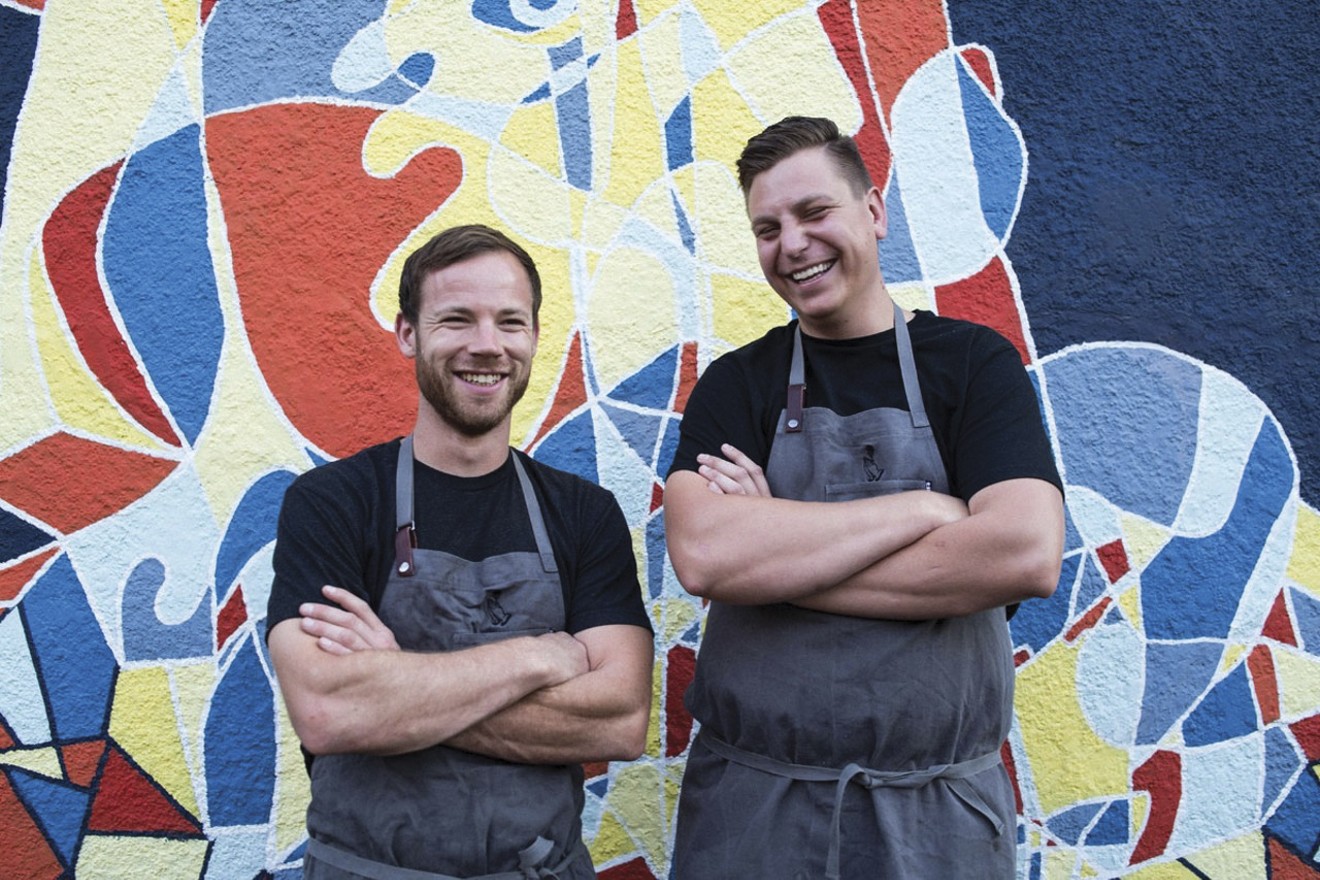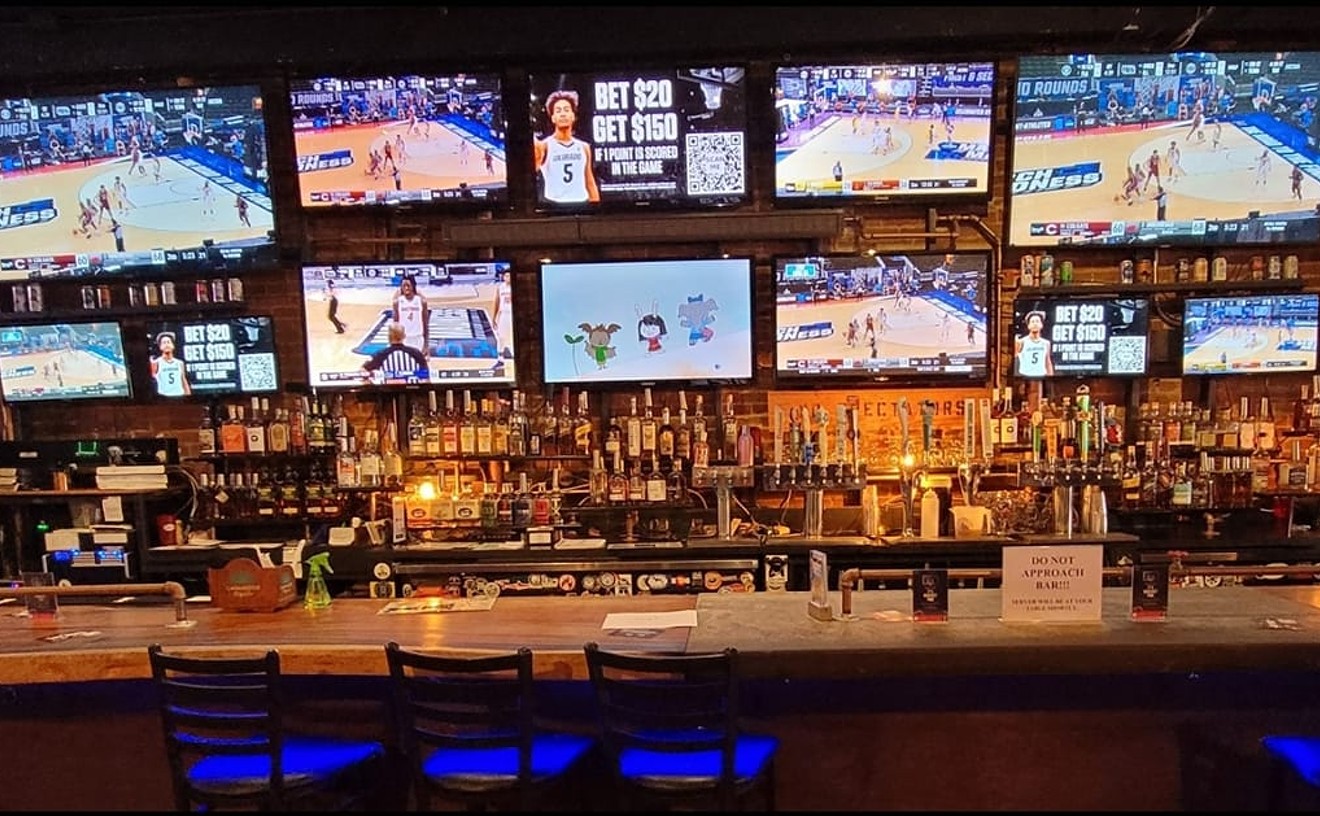We caught up with five of these new proprietors to talk about the lessons they learned during their first foray into ownership — and ask what advice they’d give would-be restaurateurs considering picking up a lease.

Caroline Glover added the cozy and charming Annette to the Stanley Marketplace this year.
Courtesy Caroline Glover
Annette
2501 Dallas Street, Aurora
“All the cliché things you hear are true,” says Caroline Glover, who opened Annette in Stanley Marketplace in February. “It’s going to take longer than you think, and it’s going to cost way more than expected. The more you hear that, the better.” Get everything in writing, she advises; that’s even more essential if you’re opening in a place where several buildouts are happening at once, as was the case with Annette.
Glover had spent plenty of time in high-profile kitchens — including a three-year stint at Acorn — but that didn’t completely prepare her for owning her own place. In particular, she wasn’t ready for the emotional investment that goes along with having your name attached to a project. “Getting a thicker skin has been the hardest thing for me,” she says. “You’re putting yourself on the line, making food in an intimate spot for a crowd of people.
They’re paying for it, and you hope they all love it, and they don’t all love it. You have to take what you can from criticism and keep moving forward. The biggest lesson I’ve learned is that you’ve got to toughen up and listen to the gut.”
After she spent months obsessing over her online reviews, for example, Glover was banned from reading Yelp by her husband. And now she’d advise any new restaurateur to let a loved one handle that aspect of the business, bringing issues to an owner’s attention only when they spot a pattern.
Despite the criticism, Glover’s glad she’s stuck to her guns when it came to the menu. “I got a rough review, and it made me step back and think, are people not getting it?,” she recalls. “From the neighborhood I’m in, I’ve heard, ‘You should take this off, this is too crazy.’ But sticking to our guns has proven to be good: People have tried things they wouldn’t have tried before.”
That dovetails with one of her biggest lessons: “Listening to your gut is really important,” she emphasizes. “I never really understood that before opening a restaurant.”
Glover says she found her rhythm after about six months, and running the restaurant continues to get easier. But would she do it again? “I’m not opening a next one,” she says. “I’m not going to do it again. I’m not a big restaurateur. This is my life. I’ve made it into a lifestyle, and I can’t imagine not being here every day. I can’t imagine going through this again. This is exactly what I wanted.”
Spencer White and Alex Figura
Dio Mio Handmade Pasta
3264 Larimer street
Dio Mio had a tight launch budget, and as a result, Spencer White and Alex Figura were on site almost constantly during the buildout of their space at 3264 Larimer Street. Luckily, that’s something they wouldn’t change for the world. “If we did do it again, we’d still be there every day,” says White. “It’s helpful to watch the process from beginning to end, to see who’s doing what, to watch the whole thing come together. A lot of people don’t do that. We really enjoyed the whole thing and thought it was really interesting.”
Both partners came from fine-dining restaurants — Figura is an alum of Vetri, Blue Hill Stone Barns and Frasca, while White was raised in Frank Bonanno’s empire, and they cooked together at the now-shuttered Lower48 Kitchen. So much of their learning curve was about taking the skills they’d learned through those experiences and adapting them to a fast-casual restaurant. “Counter service was a huge learning curve for us,” says White. “It’s something we tried to wrap our brains around before opening but had to experience to get it dialed in. We’re still working on it.”
“We’re not general managers, so it was learning how to be more hands-off but really mimic the great experience you can get at a high-end restaurant,” adds Figura. “At the beginning, that was a struggle. We wanted to do more, but we couldn’t. There’s only three of us working on a really busy night, so it’s about how to balance and create a great experience.”
It took the chefs a couple of months to find their groove after they opened last November, and even now, they say they’re still working on fine-tuning, tweaking the balance of the menu so they don’t overwhelm their cooks, and educating all of their employees to handle all parts of the operation instead of sticking to defined front-of-house or back-of-house roles.
Their advice for would-be owners? “Do your research,” says Figura. “Study the demographic, read how they eat, think about how your restaurant is going to function, and think about how that’s all going to work together to create a successful restaurant.”
Elise Wiggins
Cattivella
10195 East 29th Drive
Before Elise Wiggins opened Cattivella at 10195 East 29th Avenue in April, the chef had spent twelve years as the face of Panzano — a post that not only cemented a legion of fans, but also set her up to run her own business. “With Kimpton Hotels, you’re an independent operator,” she says of the hotel group that owns the Hotel Monaco, which houses Panzano. “The company was smart about weeding out middlemen. You do your accounting, your budgeting, your payroll — you do everything. I felt really confident going into this, having opened so many restaurants. But let me tell you, I’ve learned so much. This business — it’s a clock with a million moving parts. They’re so interconnected; if one part is skewed, it clogs the system. You can’t just get by without that part.”
Her first lesson came before her restaurant even opened: The general manager she’d planned to work with took a new job two months before launch, throwing a wrench into her training plans. “I had to really learn to shuffle,” she says. “I learned that I need to make sure that I am really responsible for both sides, to be prepared to have absolutely no one helping me.”
She was still feeling the effects of that personnel change four months after opening, when Westword’s Gretchen Kurtz reviewed Cattivella and called out the missteps in service. “It was a needed sting,” Wiggins says. “I couldn’t be in two places at the same time. Now the dust has settled, and I’ve weeded through the staff to get strong core staff, so I jumped into the front of the house. Recently, our scores shot back up with regard to service.”
Wiggins lives in Stapleton, so she knew the neighborhood would respond well to the food; she hasn’t had to tweak the menu much to please the crowds that come nightly. And she knew she’d be dealing with mostly young families, so she made her restaurant approachable and casual to cater to them. But what did surprise her was the pace of service. “The place dies off at 8:30, even on Friday or Saturday,” she says. “Everyone comes in the first two hours. We get pounded, then everyone goes home.” She decided to close earlier as a result.
Wiggins took her time opening her own place, preferring to wait until she could self-finance. But now that she’s taken the plunge, she can’t imagine returning to the alternative. “I live and die by my decisions,” she says. “I can’t tell you how amazing that feels.”

Regan and Louie Colburn started Ohana as a walk-up lunch window before moving to their current location.
Laura Shunk
Ohana Island Kitchen
2563 15th Street
If you’re going to open a restaurant, “everyone you know is going to tell you how it should be done,” says Louie Colburn, who owns Ohana Island Kitchen with his wife, Regan. “You have to sort through it and lean toward advice from people who have been there — especially people who have managed people.”
The Colburns opened their sunny poke shop at 2563 15th Street last November, expanding from the takeout window they’d operated just around the corner at the back of the Truffle Table. And, just like that setup, Ohana quickly had more business than the couple could handle. They wanted to expand into dinner service, but it was hard to hire: This past summer, they parted ways with a manager who wasn’t meeting expectations, and they had to revert to lunch-only hours as a result. “I’m having difficulty expanding business and maintaining nighttime hours because of difficulty with recruiting and maintaining employees,” says Louie. “It’s very challenging to foster loyalty.”
The pair is now focused on employees who take work seriously and have strong standards — people who will cover shifts and come to work on time, even if they have no culinary experience. But still they struggle to find talent. “The workforce has so many options right now,” says Louie. “As first-time small-business owners, we don’t have the upper hand hiring employees.” And until they alleviate that pressure point, they’ll have trouble growing, he says.
One marker of Ohana’s success that Louie didn’t anticipate: copycats. Poke exploded soon after the restaurant opened, and a couple of those new operations are suspiciously similar to the Colburns’, either in name or menu — or both. “You have to choose to focus on yourself,” says Louie. “Any deviation of your energy takes away from your work.”
In the face of such challenges, it’s good to have a wellspring of genuine enthusiasm from which to draw, he says: “I realized the motivation to start something can’t be based on a trend. Having something genuine behind it really sets things into action.”













